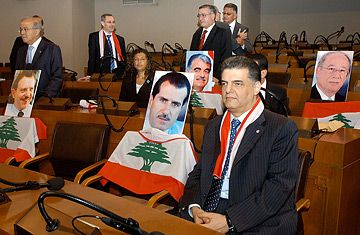
Lebanese parliament members sit near pictures of assassinated deputies as the parliament met for the first time in nine months, September 25, 2007.
Lebanon's art-deco parliament building in downtown Beirut has the look of an old-time movie palace, which seemed appropriate on Tuesday as a steady stream of armored black luxury cars disgorged the country's politicians, who walked up the steps through a gauntlet of journalists as if they were actors at a high-security red-carpet ceremony. As it happened, however, the show was a dud. Meeting for the first time in over nine months, Lebanon's parliament opened today for a special session to elect a president of the republic, and then almost immediately shut down without a vote. Lebanon's political crisis continues.
The hitch in parliament was that the Hizballah-led opposition — which controls over a third of the chamber's deputies — boycotted the proceedings, preventing the country's majority from having the two-thirds quorum necessary to move to a vote. But the larger problem is that the country's factions are locked in a struggle that has become part of the regional struggle for Middle East supremacy, with Syria and Iran on one side and American and Israel on the other.
Lebanon's American-supported ruling coalition — made up of Sunni Muslims and some Christians — wants the presidency for one of its own, in order to press forward with measures intended to stop what they see as examples of Syrian and Iranian interference: weapons smuggling and political assassinations. But Hizballah, which wants a candidate who won't interfere with the Shi'a Muslim militant group's attempt to rearm itself for the seemingly never-ending struggle with Israel, has found common cause with those Christians who have been suspicious of the Lebanese government's alliance with America. (Many Christians worry that the U.S. wants to permanently resettle Palestinian refugees — most of whom are Muslims — in Lebanon.)
Though they have fewer representatives in parliament, the opposition was able to delay the presidential vote because Lebanon's sectarian political system has a series of checks and balances that keeps governments weak and any one religious group from holding too much power. Thus, major official positions such as the president (who must be Christian), the prime minister (who must be Sunni Muslim) and the speaker of parliament (who must be Shi'a Muslim) are usually chosen by a process that includes both elections and negotiation. The idea is to have national consensus and avoid the kind of disputes that led to the 15-year civil war that ended in 1990.
But it remains to be seen when parliament meets again in October if consensus is possible. Most Lebanese have had enough of instability and war, and a large majority wants a consensus candidate to be chosen for president — perhaps the governor of the central bank, or the head of the army. But the horse-trading in parliament is being done by politicians who are to a certain extent immune from accountability: sectarian leaders practically guaranteed their position by a system in which voters keep voting along sectarian lines.
There are signs that progress toward a choice for President is slowly coming along. At least one government minister today suggested that the political dialogue in parliament might be restarted by removing from the table the contentious issue of Hizballah's weapons — that is, its existence as an armed force separate from the Lebanese government military. But tabling that issue will only postpone having to deal with the 800-lb. missile-toting gorilla in the room. If the cold war in the Middle East gets hot again, Hizballah and its rockets could well be back on the battlefield — which is inevitably going to be Lebanon.
